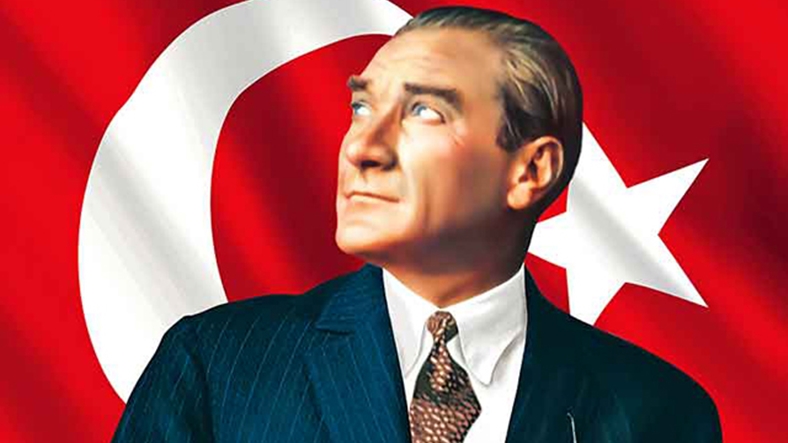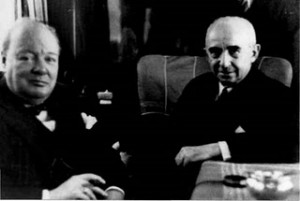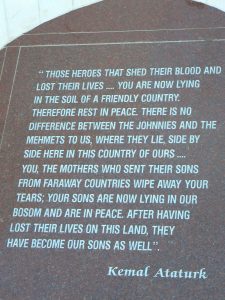
Why the Turks Like Churchill
How great was Atatürk? The question came up in a class examining Turkish attitudes to Churchill, which one might expect would be hostile. In 1914, Churchill’s Admiralty denied Turkey two battleships being built in Britain as World War I erupted. In 1915, Churchill pushed hard for (though did not conceive of) the attacks on the Dardanelles and Gallipoli. (See also “comments” on this post from thoughtful Turks.)
Atatürk
One historian speculated that Churchill mirrored the courage and resourcefulness of Mustafa Kemal (Atatürk). Another said there “might be a lingering impression that Churchill had helped save Turkey from the red menace by his resistance to Russian demands on the Dardanelles. Of course it was Harry Truman who did the heavy lifting there [through the Truman Doctrine]”

The Turks have abundant reasons to feel positive toward Churchill, aside from his personal courage, and his post-1945 resistance to Soviet designs on the Dardanelles (when he was out of office and powerless).
Churchill’s liking for Turkey dated back to 1910, when he toured Anatolia—partly on a locomotive cow-catcher!—and “met many of the brave men who laid the foundations of modern Turkey” (as he wrote to Turkish President Ismet İnönü in 1943).
Churchill’s Admiration
Churchill undertook several risky trips in the Second World War. His visit to İnönü was one of them. He went to Istanbul after Casablanca, in a period when he was away from home four weeks.
Nor was the meeting entirely in vain, as he told Parliament in May 1944. Despite “an exaggerated attitude of caution,” İnönü intervened to halt chrome exports to Germany. This was more important then than it may seem now.

While understanding that he ruled by diktat, Churchill had profound admiration for Atatürk. He wrote in 1938:
The tears which men and women of all classes shed upon his bier were a fitting tribute to the life work of a man at once the hero, the champion, and the father of modern Turkey. During his long dictatorship a policy of admirable restraint and goodwill created, for the first time in history, most friendly relations with Greece. (Churchill by Himself, 321).
Chanak
Sir Martin Gilbert’s Churchill: A Life (and his biographic volume IV in more detail) record Churchill’s performance in the 1922 Chanak crisis. This added to his Turkish credits.
Churchill persistently argued, in telegrams, letters and Cabinet meetings, for a firm stance by Britain and the Dominions. But he restrained a bellicose, pro-Greece Lloyd George from acting rashly when the Turks marched toward British-occupied Chanak.
Eventually there was a negotiated settlement. With that, the Conservatives bolted the Lloyd George Coalition. This cost Lloyd George his premiership and Churchill his seat in Parliament. Martin Gilbert concludes (Churchill: A Life, 454):
Churchill saw the Chanak crisis as a successful example of how to halt aggression, and then embark on successful negotiations, by remaining firm. But “Chanak” had become the pretext not only for the fall of the Government but for one more, unjustified, charge of his own impetuosity.
Meeting İnönü
Gilbert’s Churchill: A Photographic Portrait records WSC’s 1943 letter above, which he handed İnönü when they met. After remembering “the brave men,” Churchill explained:
There is a long story of the friendly relations between Great Britain and Turkey. Across it is a terrible slash of the last war, when German intrigues and British and Turkish mistakes led to our being on opposite sides. We fought as brave and honourable opponents.
But those days are done, and we and our American Allies are prepared to make vigorous exertions in order that we shall all be together…to move forward into a world arrangement in which peaceful peoples will have a right to be let alone and in which all peoples will have a chance to help one another.
Not bad for the hoary old imperialist. This represents rather an improvement on some more recent western overtures to Turkey. I suspect many Turks still feel pretty good about Churchill. The Adana, Turkey siding where the İnönü meeting occurred has been turned into a park dedicated to peace.







13 thoughts on “Why the Turks Like Churchill”
The heartfelt speech attributed to Ataturk about Turks and Australians in Gallipoli is historically dubious, extensive research shows.
=
Correct, as I stated in the caption. Thanks. RML
One must separate the WW1 and WW2 Churchill. The first came to an end in Gallipoli, where Mustafa Kemal played a key if not the most important role (see German Commander Liman von Sanders autobiography). Churchill did indeed pay the price with his office and. for a time, his reputation.
Mustafa Kemal saw the demise of the Ottoman Empire coming and envisaged a modern Turkish State. His experience through the late Ottoman Parliaments and the İttihat and Terraki (Progress and Union Party) led him to see how a strategically important land like Turkey could be swayed by Great Power politics. He saw the need for Turkey to create a strong foundation and the institutions of democracy. The Turkish state was in shambles when it was formed; education and religious reform and economic development were paramount. They could not hitherto been achieved with Great Power politics. Kemal’s dictatorship was undemocratic but absolutely essential in building modern Turkey.
It is through this lens that we see Churchill’s second coming, where he was the defender of liberty and aggression, had a friendly and admirable view of Mustafa Kemal—once a foe, then a dignitary, eventually an ally.
Judging Atatürk I leave to those more knowledgeable than I, but there is an interesting discussion on Reddit. Atatürk was, as one writer notes there, an officer fighting on Gallipoli during the Armenian massacres. See: http://bit.ly/2siytPR. But to be fair, Atatürk did a lot of anti-Greek ethnic cleansing when he first came to power.
We cannot change the past, but we can learn from it. We often congratulate ourselves for admitting that a great figure was imperfect and human. But that is not the main point. It is not even an interesting point. The unusual thing about Churchill (and perhaps Atatürk) is not that he was human: there are billions of humans. It is that he was excellent. If great simply means prominent, Churchill and Hitler were both great. If great means excellent, Churchill qualifies and Hitler doesn’t. If the criterion is excellence (on the whole, based on everything someone did), then there is a sliding scale and Hitler ranks at the bottom.
Robert E. Lee, to take an American example, is high on that scale, even though he wasn’t always right. He was wrong in choosing loyalty to Virginia over loyalty to the Union. “The right tone to take with him, after his cause was destroyed,” says a scholar and friend of mine, “is one of courtesy and acceptance of those who followed him. They are fellow countrymen and this is the way to make them better ones. Lincoln shows the way at the end of his second inaugural address.”
You may decide whether Lincoln’s advice applies to Atatürk: “With malice toward none, with charity for all, with firmness in the right, as God gives us to see the right, let us strive on to finish the work we are in, to bind up the nation’s wounds.”
Lincoln’s words were closely repeated by Churchill—and Atatürk (his authorship is disputed) on a monument to fallen “Johnnies and Mehmets.” I have added this to my post above. Thank-you for your thoughtful message.
I admire your thoughts about Atatürk. He was indeed a great man but he also had his flaws and got his hands dirty. I admire him for the fact that he managed to create a civil code and that he finally managed to push us Turks into the next century. But I also do believe in freedom of speech and that the flaws of Atatürk should be debated. He was a dictator after all. If we look at the circumstances and the era, we may conclude that there was no other option. Or maybe there was, but we will never know because we cannot change the past.
This is a complicated subject. Churchill’s account is in Chapter 19 of “The Aftermath” where he writes: “…having done my utmost for three years to procure a friendly peace with Mustafa Kemal and the withdrawal of the Greeks from Asia Minor, and having consistently opposed my friend the Prime Minister upon this issue, I now found myself whole-heartedly upon his side.”
Churchill is referring to Lloyd George’s bellicose attitude toward Turkey when Kemal seemed to threaten British enclaves at Istanbul and Chanak (Cannakale), which had been maintained since victory in 1918.
In late 1921 Churchill urged Lloyd George to come to terms with Turkey: “The desire you have to retain Mosul, and indeed Mesopotamia, is directly frustrated by this vendetta against the Turks…” But in summer 1922 the Kemal forces, having defeated the Greeks and were marching on Izmir (Smyrna), and seemed to threaten (but did not attack) the British garrisons. Churchill, as he wrote, now found himself on Lloyd George’s side.
The Wikipedia Chanak entry says Churchill “wanted war,” but this is oversimplified. What he wanted was not to reward the defeated Ottomans with a victory they had not won in World War I. There was a broad fear in Britain against giving Turkey back a foothold in Europe. Churchill, who admired Atatürk, ultimately supported negotiation that did allow this.
Eastern Thrace had been awarded to Greece by the harsh Treaty of Sèvres (1920), and Istanbul was placed in a so-called “neutral zone.” (Atatürk, quite naturally, wanted Turkey’s capital back.) In negotiations in October 1922 it was given back, restoring Turkey’s presence in Europe and complete command of the Bosporus Straits. This was confirmed (and the British garrisons ended) by the Lausanne Treaty of 1923-24, which superseded the Sèvres Treaty and established the borders of modern Turkey.
By encouraging the Greeks to attack Turkey during their struggle for independence, the British and Allies wanted to break apart the Ottoman mainland and take Istanbul. Was Churchill against this? I don’t know.
Sorry, I can’t track it. (“But Musfafa Kemal”…did what? Destroyed British plans?) Churchill appreciated the qualities of enemy commanders. I’m not sure what role Kemal played in the Dardanelles, but Churchill expressed admiration for his later actions to repulse the landings at Gallipoli. In The World Crisis Vol 2 (1915) he writes:
“The two Turkish divisions who were left without help of any sort to face the onslaught of the Allied Army were shrewdly disposed….At the head of the 19th Division there stood in this strange story a Man of Destiny. Mustapha Kemal Bey had on April 24 ordered his best regiment, the 57th, a field exercise
for the next morning in the direction of the high mountain of Sari Bair….Kemal was ordered merely to detach a single battalion to deal with [the landings]. But this General instantly divined the power and peril of the attack. On his own authority he at once ordered the whole 57th Regiment, accompanied by a Battery of Artillery, to march to meet it. He himself on foot, map in hand, set off across country at the head of the leading company.
The distance was not great, and in an hour he met the Turkish covering forces falling back before the impetuous Australian advance. He at once ordered his leading battalion to deploy and attack, and himself personally planted his mountain Battery in position. Forthwith – again without seeking higher authority – he ordered his 77th Regiment to the scene. By ten o’clock, when the Turkish Commander-in-Chief galloped on to the field, practically the whole of the Reserves in the Southern part of the Peninsula had been drawn into the battle, and ten battalions and all the available artillery were in violent action against the Australians.”
He also shared Ataturk’s magnanimity for the fallen on both sides and admired his peacetime leadership. Writing in 1937 on the 19th anniversary of the Armistice, concerning the changes since, he said: “…Turkey, no longer the enemy of Russia or of Greece, is, under the leadership of Mustapha Kemal – the only Dictator with the aureole of martial achievement – reconciled with what used to be called ‘the Allied and Associated Powers.'”
There’s been a quote going around in Turkish social media, supposedly said by Winston Churchill about Ataturk in 1915. “çanakkale savaşında her şeyi göze almıştık, planlamıştık… bir tek mustafa kemal dışında…” Roughly translated as “We envisioned and planned everything in Canakkale (Chanak)…but Mustafa Kemal”
I couldn’t find any source other than Facebook fan pages for this. Is there any validity to this quote? Did Churchill say anything along these lines or about Ataturk and the WW1?
@SINAN CALISKAN Sinan bey, I’m so incensed by your comment: “I hate Winston Churchill… because he tried to finish our roots and country” that it has motivated me to reply a second time. The Dardanelles campaign was a part of the First World War. In that war, Churchill was very focused on beating the Germans, not intent on destroying Turkey, merely intent preventing it from carrying on as a German ally. Ataturk had opposed Turkey becoming a German ally. On 16 July 1914, he sent a dispatch from Sofia to the Ministry of War in Istanbul, urging aneutrality in the event of war, but Enver Pasha overruled him and the Ottoman Empire came into the war on the side of the Germans (source: p. 60 of “Ataturk: The Re-birth of a Nation” by Lord Kinross).
@SINAN CALISKAN Sinan Bey, You say: “I hate Winston Churchill… because he tried to finish our roots and country.”
You have completely misunderstood the situation. He wanted to remove Turkey, as one of Germany’s allies, from the war. That is not the same as trying “to finish our roots and country.” I also don’t understand why you loathe the Anzacs. See the quotation above by Atatürk, on the Gallipoli Battlefield, that starts: “Those heroes that shed their blood and lost their lives, you are now lying in the soul of a friendly country. Therefore rest in peace. There is no difference between the Johnnies and the Mehmets to us.”
Isn’t there enough hate in the world without manufacturing more of it with sweeping misjudgments? The 1915 Dardanelles-Gallipoli operation was an attempt by the WW1 Allies to relieve the Russians on the Black Sea and to force Turkey, fighting with the Germans, out of the war, not to “finish” Turkey’s “roots.”
It is perhaps worth bringing to your attention another quotation by the great Atatürk, which is on a plaque on the Gallipoli Battlefield:
“Those heroes that shed their blood and lost their lives, you are now lying in the soul of a friendly country. Therefore rest in peace. There is no difference between the Johnnies and the Mehmets to us. Where they lie, side by side here in this country of ours…You, the mothers who sent their sons from faraway countries wipe away your tears; your sons are now lying in our bosom and are in peace. After having lost their lives on this land, they have become our sons as well.”
I’m a native Turk and I hate Winston Churchill despite our great leader whatever said about him, because he tried to finish our roots and country by using Anzacs [Australia New Zealand Army Corps which landed on the Gallipoli Peninsula in 1915]. I also don’t like Anzac and any Australians who represent them now for every year celebrations at Dardanelles (Çanakkale). They tried to kill us. I never forget this.
Aaaaaaw. Turks like Winston Churchill because since they won their Independence war and Gallipoli they have no problems with his ambitions from that time. But later, during the second WW he was awesome, which is why Turks admire him, like the rest of the world mostly.
Comments are closed.